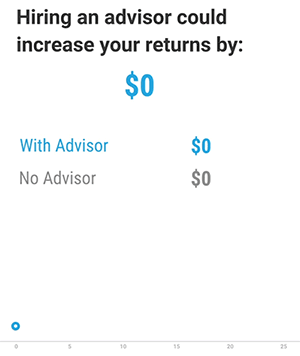




Hiring a financial advisor is one of those pivotal life decisions - a fork in the road that can dictate the path of your financial future for decades to come.
A study from Northwestern Mutual of the attitudes and behaviors of American adults toward money found that 71% of them felt their financial planning needed improvement, while only 29% work with a financial advisor.1
Research suggests people who work with a financial advisor feel more at ease about their finances and could end up with about 15% more money to spend in retirement.2
The value of working with a financial advisor varies by person and advisors are legally prohibited from promising returns, but research suggests people who work with a financial advisor feel more at ease about their finances and could end up with about 15% more money to spend in retirement.2
While hiring a financial advisor can help you maximize your retirement nest-egg, there are some potential pitfalls you should be aware of before you choose who to hire.

A fiduciary financial advisor is held to a strict fiduciary standard. That commitment is a powerful one -- one that means that they must always act in the best interest of their clients, avoid conflicts of interest and dislcose any potential conflicts of interest and to provide all relevant facts to their clients.
If you’re currently heeding the advice of a non-fiduciary advisor, use our free tool to find a fiduciary who operates with your future in mind.
Resist the temptation to quickly cross “hire a financial advisor” off your to-do list. While it may be convenient to select an advisor who is close to your home or close to your family, a decision as big as your financial future requires more than cursory consideration. Find a few options here to interview before committing. Before you commit to an advisor, it is important to do your research and compare. Our free matching tool will match you with up to 3 to compare.
Your overall risk tolerance is a personal preference, one that varies widely among financial advisors. Some have a penchant for aggressive stock investments, while others may encourage more secure bonds. Look for an advisor whose risk tolerance either matches or is willing to match yours.
In life, plenty of advice comes cheaply. Not financial advice. Financial advice can have life-altering consequences. As such, ask your potential future advisor about their tests passed, licenses awarded, and credentials earned.
Fees matter. High fees can cut into your returns and affect your overall nest egg. But the ways fees are levied vary. Some are “fee only,” charging a flat rate regardless of usage. Others take a percentage of all assets under management. Some earn commissions directly from mutual funds or other financial products, which presents a significant conflict of interest.
Chances are, there are several highly qualified financial advisors in your town. However, it can seem daunting to choose one.
Our free matching tool can help you find vetted fiduciary advisors that serve your area. Just answer a few simple questions and you’ll be matched in minutes with up to three financial advisors. Be mindful that not all financial advisors are created equal, after all, and given the important role they can play in helping you work toward trying to achieve your financial goals, it’s a decision you want to get right. It’s worth devoting time and effort to comparing and researching advisors to find the right one for you that you will want to work with for years to come.
SmartAsset Awards & Accolades
Management Solution
2020 FINALIST
Technology Company - NY
FINTECH AWARDS - 2021
for Personal Finance
2019


